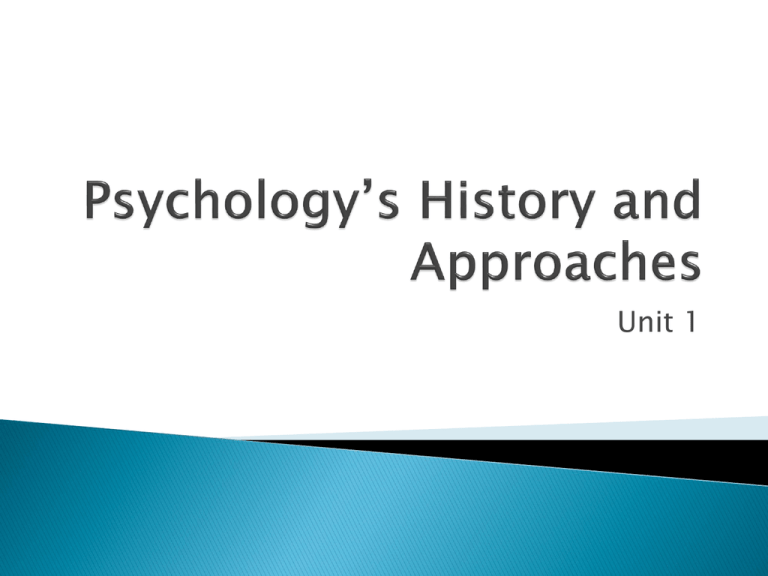Psychology's History and Approaches
advertisement

Unit 1 Empiricism Structuralism Functionalism Experimental psychology Behaviorism Humanistic psychology Cognitive neuroscience Psychology Nature-nurture issue Natural selection Levels of analysis Biopsychosocial approach Biological psychology Evolutionary psychology Psychodynamic psychology Behavioral psychology Cognitive psychology Social-cultural psychology Psychometrics Basic research Developmental psychology Educational psychology Personality psychology Social psychology Applied research Industrialorganization psychology Human factors psychology Counseling psychology Clinical psychology Psychiatry SQ3R • • • Empiricism • Experimental psychologists Sturcturalism Functionalism Ancient Greek philosophers ◦ Socrates & Plato: logic basis Mind separate from body & continues on after death. Knowledge is innate (born with us) ◦ Aristotle: data basis Observed principles from observations Claimed knowledge grows with experiences 1600’s philosophy and theory ◦ Rene Descartes (French philosopher) Agreed with Socrates & Plato with innate ideas and mind being separate from the body (dualism). Animal spirits flowed through the fluid in the brain and nerves, eventually creating memories. ◦ Francis Bacon (English philosopher) Presented the idea that the human mind always tries to make patterns of random events. (Novum Organuum) Made an observation that we remember events to confirm our beliefs. ◦ John Locke (British political philosopher) Mind at birth is a tabula rasa (blank slate) Helped originate the idea of empiricism (science should rely on observation and experimentation.) Wilhelm Wundt ◦ Created the first experimental apparatus at the University of Leipzig in Germany in 1879. ◦ Measured awareness based on hearing and then perceiving of a telegraph sound. ◦ Wundt’s students were the first psychology graduate students. Branches of psychology soon were born ◦ Structuralism ◦ Functionalism ◦ Behaviorism Edward Bradford Titchener ◦ Wundt’s student receiving his Ph.D. in 1892 and joined Cornell University ◦ Introduced Structuralism Attempted to engage people in self-reflective introspection (looking inward) while reporting elements of their experience. Had the view that “there is one thing, and only one in the whole universe which we know more about than we could learn from external observation…we have, so to speak, inside information” (ourselves) Problems: Introspection required smart, verbal people. Results varied from person to person and were unreliable. Often, we don’t understand why we feel or do the things we do. William James ◦ Consider evolved functions of our thoughts and feelings. The nose smells, the brain thinks ◦ Believed thinking was adaptive/helped humans survive. ◦ Consciousness is a function in which we consider our past, present and future. ◦ Most known for his teaching at Harvard ◦ Admitted Mary Calkins (first female) into his graduate seminar, where all the males dropped out. ◦ Made the first psychology text book called Principles of Psychology, which took him 12 years (10 longer than he anticipated.) Mary Calkins Margaret Floy Washburn ◦ Tutored her exclusively, but she was refused a degree by Harvard, but was offered a degree by Radcliffe instead; she refused it. ◦ Went on to become a memory researcher and the first APA female president in 1905. ◦ Became the first female psychology student ◦ Became the second female APA president in 1921. ◦ Barred from joining the organization of experimental psychologist, though her adviser Titchener founded it. • • • • Behaviorists Humanistic Psychology Cognitive neuroscience Psychology Psychology developed from established fields of philosophy and biology. ◦ ◦ ◦ ◦ ◦ Wundt: philosopher and physiologist James: American philosopher Pavlov: Russian physiologist Freud: Austrian physician Piaget: Swiss biologist In the 1920’s, psychology was defined as “the science of mental life.” Between the 1920’s and 1960’s, psychology was redefined as “the scientific study of observable behavior.” ◦ Wundt, Titchener, James, and Freud ◦ Watson & Skinner (Behaviorists) The 1960’s and beyond, many rebelled against Freudian psychology and behaviorism. ◦ Rogers, Maslow (Huminists) Also in the 1960’s, the cognitive revolution started which led to cognitive psychology and cognitive neuroscience. Today, psychology is defined as the science of behavior and mental processes. ◦ Behavior: meaning what an organism does or observable action ◦ Mental processes: meaning the internal subjective experiences we infer from behavior Nature-nurture issue ◦ Very old concept, yet still debated today. Natural selection: Darwin ◦ Darwin’s idea of selective traits which enable an organism to survive. ◦ Believed that natural selection occurs with both animal traits and animal behaviors. • • • • Levels of analysis Biopsychosocial approach Biological Evolutionary • • • • Psychodynamic Behavioral Cognitive Social-cultural The levels of analysis are differing complimentary views for analyzing any given phenomenon. ◦ Biological influences: Natural selection of adaptive traits Genetic predispositions responding to environment Brain mechanisms Hormonal influences ◦ Psychological Influences: Learned fears and other learned expectations Emotional responses Cognitive processing and perceptual interpretations ◦ Social-cultural influences: Presence of others Cultural, societal, and family expectations Peer and other group influences Compelling models (such as in the media) Biological Social-cultural Evolutionary Humanistic Psychodynamic Cognitive Behavioral • • • • • • • Psychometrics Basic research Developmental psychology Educational psychology Personality psychology Social psychology Applied research • • • • • Industrial-organizational psychology Human factors psychology Counseling psychology Clinical psychology psychiatry Psychometrics Biological psychology Developmental psychology Cognitive psychology Educational psychology Personality psychology Social psychology Industrial-organization (I/O) psychology Human factors psychology Counseling psychology Clinical psychology Psychiatry Basic research Applied research •Builds psychology’s knowledge base. •Tackles practical problems




